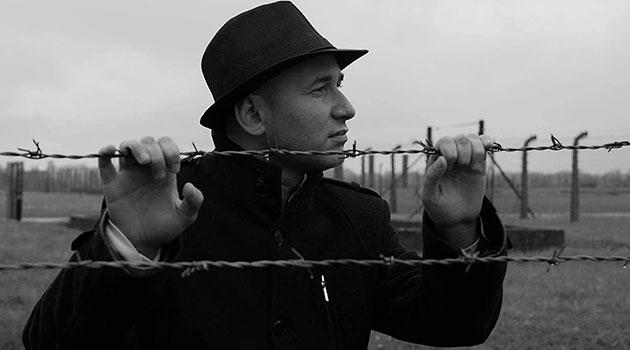Miroslav Rác: 21st century classical music teaching the lessons of the Holocaust and its Romani victims

There has never been a lack of excellent musicians among Romani people. Composers, though, are a rarer phenomenon.
One such composer is Miroslav Rác (age 31) from Levice, Slovakia. This excellent pianist and graduate of the conservatory in Topoľčany composes classical music and his works are absorbed in the subject of the Holocaust, which has a strong resonance in his own family.
This interview with Mr Rác was first published in Czech last September. It is part of a long-term collaboration between the news server Romea.cz and the Romano hangos periodical.
Q: Miroslav, what was your journey to music like? Why did you choose the piano?
A: I grew up with music from my early childhood and I have played piano since the age of 13. I chose it myself as the instrument for my life’s work. I was attracted by its sound, its range, and the temperament that can be expressed by using it. The piano has been a daily part of my life ever since. I play daily.
Q: You really are a master player, where did you study?
A: I am from Levice, where my family lives. After completing primary school I was accepted to the conservatory in Topoľčany and graduated from there in piano.
Q: In addition to performing you are dedicated to composing music, which is a rather unique thing. How do you do that work? What genres are you active in?
A: I compose music spontaneously and I combine the motifs in my imagination. I compose 21st century classical piano music through which I want to reach all generations, irrespective of race or religion. Personally I listen to classical music, to funk, to jazz, to pop, and of the Romani groups I enjoy the Gipsy Kings.
Q: You have composed a piece for Holocaust victims – why that subject exactly? Was your family affected by the Holocaust?
A: Yes, my grandfather was imprisoned in several of those camps, he spent two years of his life in them. In Dubnice nad Váhom he experienced and saw the terrible things done to the prisoners there – the abuse, the beatings, shooting people on absurd pretexts for no reason at all. Many attempted to flee but were murdered during the attempt. My grandfather managed to escape during a work shift once, he walked alone for 14 days without food and eventually survived. However, I want to say that my work is dedicated to all Holocaust victims, not just the Roma. It is in honor of all who suffered and died in the concentration camps. One cycle from these pieces is the “Poem in A minor”, for which I have also made a video.
VIDEO
Q: That is a cruel fate that befell your grandfather and a very strong story. Where did you film this video? One can’t make a film about such a subject just anywhere.
A: It was made in Poland at the site of the former Auschwitz-Birkenau concentration camp, which provided us with authentic conditions. Moreover, it was raining the entire time we filmed, and thanks to that we managed to capture an atmosphere of fear and pain. When I arrived there I had the strong feeling that I had already been there before and experienced something there.
Q: The composition “Poem in A Minor” and the video has enjoyed great success, what kinds of responses are you receiving to it?
A: Positive reactions from all over the world. The video is being shared by international Facebook pages dedicated to classical piano music, the piece is also already being played on prestigious classical radio stations worldwide.
Q: That’s brilliant. What are you working on now? Will you continue with this subject?
A: Yes, I am preparing a CD of my works dedicated to Holocaust victims. Through the emotions I have invested in the music I am expressing my respect for the victims and the suffering they must have experienced. I want us not to forget about the horrors of the past and to not give the Fascists room to implement their ideas today.
Q: Do you have a life dream, or a musical one, that you would like to see come true?
A: Since childhood I have desired to compose music that would speak to all nations. I am glad that I can say I am creating my dream, already living it.
First published in Romano hangos
